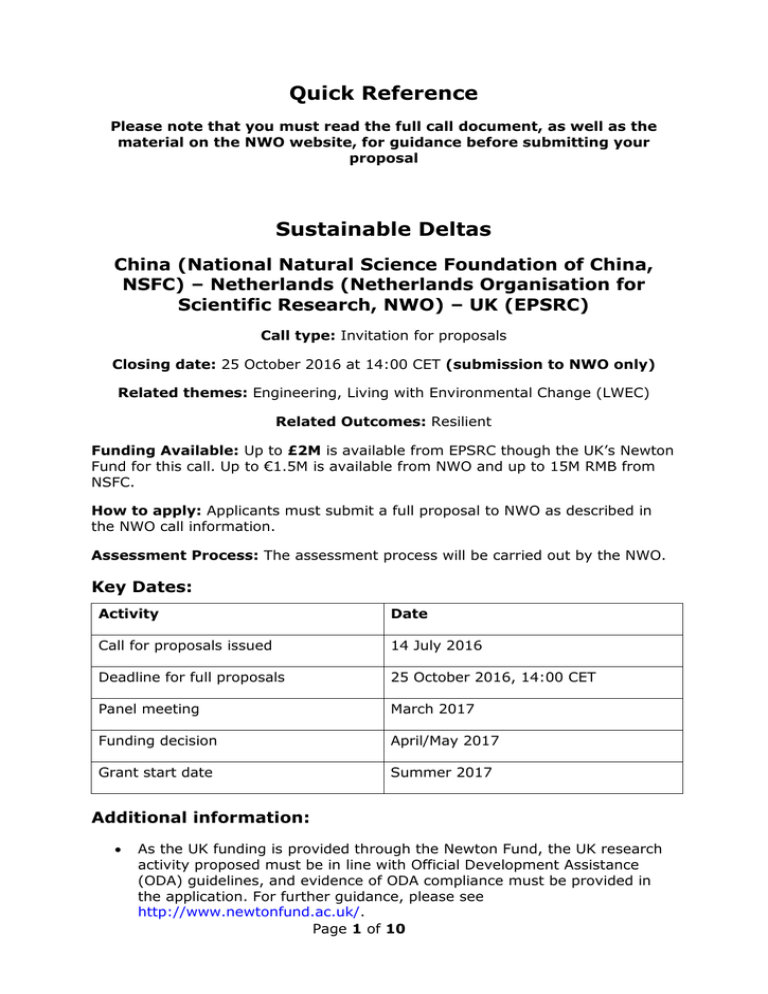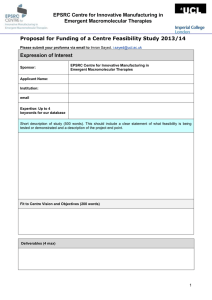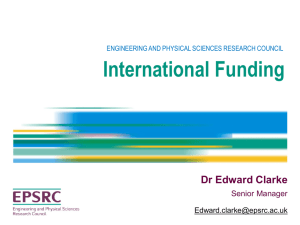Sustainable Deltas
advertisement

Quick Reference Please note that you must read the full call document, as well as the material on the NWO website, for guidance before submitting your proposal Sustainable Deltas China (National Natural Science Foundation of China, NSFC) – Netherlands (Netherlands Organisation for Scientific Research, NWO) – UK (EPSRC) Call type: Invitation for proposals Closing date: 25 October 2016 at 14:00 CET (submission to NWO only) Related themes: Engineering, Living with Environmental Change (LWEC) Related Outcomes: Resilient Funding Available: Up to £2M is available from EPSRC though the UK’s Newton Fund for this call. Up to €1.5M is available from NWO and up to 15M RMB from NSFC. How to apply: Applicants must submit a full proposal to NWO as described in the NWO call information. Assessment Process: The assessment process will be carried out by the NWO. Key Dates: Activity Date Call for proposals issued 14 July 2016 Deadline for full proposals 25 October 2016, 14:00 CET Panel meeting March 2017 Funding decision April/May 2017 Grant start date Summer 2017 Additional information: • As the UK funding is provided through the Newton Fund, the UK research activity proposed must be in line with Official Development Assistance (ODA) guidelines, and evidence of ODA compliance must be provided in the application. For further guidance, please see http://www.newtonfund.ac.uk/. Page 1 of 10 • The UK research activity proposed in your application must be predominantly within EPSRC remit. • Standard EPSRC funding arrangements apply, except that no single items of equipment over £10k may be requested by the UK applicants. • Standard EPSRC eligibility requirements apply to this activity for Investigators and Research Organisations. Please note that applicants may only be named as Investigator on one joint proposal to this call. • UK investigators are required to submit an attachment as part of the submission to NWO to include the following elements: • o A list of the UK investigators and their affiliations (track record is not required in this attachment) o A short summary of the UK applicants’ proposed contribution to the project to confirm that the research is predominantly in EPSRC remit (no more than 1 side of A4) o A short justification (no more than 250 words) of the ODA eligibility of the UK research proposed o A brief letter of support from the UK university/ies (Head of Department or equivalent) for the application The UK projects may be up to 36 months in duration. Contacts: • Ruqaiyah Patel (Ruqaiyah.Patel@epsrc.ac.uk) – EPSRC call scope queries • Gavin Salisbury (Gavin.Salisbury@epsrc.ac.uk) – Newton Fund and ODA queries Page 2 of 10 Sustainable Deltas China (NSFC) – Netherlands (NWO) – UK (EPSRC) Call type: Invitation for proposals Closing date: 25 October 2016 at 14:00 CET Related themes: Engineering, Living with Environmental Change (LWEC) Related Outcomes: Resilient Summary The National Natural Science Foundation of China (NSFC), the Netherlands Organisation for Scientific Research (NWO) and Research Councils UK (RCUK) are long-term partners in international research cooperation. NSFC, NWO and the Engineering and Physical Sciences Research Council (EPSRC) will launch a call for trilateral research cooperation between Chinese, Dutch and UK research groups. The thematic priority of the 2016 Sino-Dutch-UK call for proposals is ‘Sustainable Deltas’. This joint activity focuses on research challenges for sustainable and safe deltas within the broader framework of the water sector. A number of thematic areas have been identified, including water availability, water system analysis, salinisation and desiccation, water governance, and new solutions for passenger and freight transportation in deltas and coastal waters. This document sets out information on submitting applications, the conditions that the applications must meet, and the procedure for assessing the applications. It also includes a brief description of the programme. Further detail on the scope of this call can be found on the NWO website. The call closes at 14.00 CET on 25 October 2016. Up to £2M is available from EPSRC through the UK’s Newton Fund for this call. Up to €1.5M is available from NWO and up to 15M RMB from NSFC. Please note that an application may only be submitted to NWO via the online application system ISAAC; no UK Je-S submission is required at the point of application. Page 3 of 10 Background The National Natural Science Foundation of China (NSFC), the Netherlands Organisation for Scientific Research (NWO) and Research Councils UK (RCUK) are long-term partners in international research cooperation. This trilateral call, between NSFC, NWO and the Engineering and Physical Sciences Research Council (EPSRC), aims to support world-leading research collaborations between Chinese, Dutch and UK research groups in the theme of ‘Sustainable Deltas’. This funding activity focuses on research challenges for sustainable and safe deltas within the broader framework of the water sector. A number of thematic areas have been identified, including water availability, water system analysis, salinisation and desiccation, water governance, and new solutions for passenger and freight transportation in deltas and coastal waters. Three focal areas have been defined: 1) Resilient urban planning and management; 2) Optimising water allocation and use in the delta; 3) Integrated coastal zone management. These focal areas link issues from the water sector to other economic and development-relevant themes, such as energy, logistics, and agri-food. Key concerns include: • Improving and maintaining quality of life through the sustainable supply of clean water for all against a background of environmental change; • Adaptation of current industrial processes and practices to reduce overreliance on the use of water. 1. Resilient urban planning and management In 2050 more than 70% of the world population will be concentrated in cities, most of which will be located in low-lying deltas. These urban centres face enormous challenges and opportunities in their development, as a result of increased competition between land uses and infrastructural requirements (i.e., spatial planning). Strengthening resilience to extreme events and adaptation to the impacts of climate change (i.e., sea-level rise, ground subsidence, peaks in water discharge from hinterlands, and to periods of water shortages) urgently requires new solutions. Challenges include: • Developing innovative governance approaches for managing floods and droughts in deltas and cities; • Designing adaptive capacity in rapidly and often spontaneously developing deltas to ensure water safety; • Combining spatial planning and sound disaster management by optimizing land use, institutions and mechanisms for more efficient, inclusive and sustainable urbanisation; • Exploring eco-dynamic design options to provide opportunities for nature as part of urban development processes; Page 4 of 10 • Reducing urban footprints and developing performance evaluation systems to mitigate environmental impacts. 2. Optimising water allocation and use in the delta Increasing population growth and economic activities, as well as impacts of climate change (i.e., high precipitation levels and droughts), cause deltaic areas to face growing problems due to scarcity and competing claims on resources. Growing demand and contamination puts pressure on fresh water supply, nutrients for food, as well as existing energy production sources. New solutions are needed in allocating water resources in relation to land-use and spatial planning. In this theme our aim is to support projects that have the potential to contribute to the realisation of a circular economy, developing sustainable technologies that help close cycles in ways that contribute to environmental or health safety and that are economically profitable. The scope of this theme includes the following areas: • water treatment and purification, • water re-use, • urban water sustainability, • energy recovery from water treatment, • real-time optimisation and management of large-scale water systems in terms of flood-risk management. It should be noted that the development of new food production technologies (‘more crop per drop’) is outside the scope of this theme. 3. Integrated coastal zone management Urbanisation processes in delta areas pose challenges and opportunities for the sustainable development of coastal zones, in particular for port areas, infrastructure, transport and fisheries. Transport-related trade may boost economic development, but may also bring negative impacts for people (e.g., land use conflicts) and the environment (e.g., pollution, the vulnerability of marine ecosystems). Marine environments also offer opportunities for energy and food production for a delta. The research challenges identified under this theme include: • Sustainable development of port areas and adaptive transport and logistic systems; • Exploring commercial exploitation of natural resources in the marine environments of deltas (energy production, fisheries). For more information about EPSRC’s portfolio and strategies, see our website: https://www.epsrc.ac.uk/research/ourportfolio/ UK applicants should also note that the UK portion of the application must be predominantly in EPSRC remit. If you have any doubts on this point please contact EPSRC before applying. Proposals not meeting this requirement will be rejected without recourse to peer review. Page 5 of 10 Funding available Up to £2M is available from EPSRC though the UK’s Newton Fund for this call. Up to €1.5M is available from NWO and up to 15M RMB from NSFC. UK projects may be up to 36 months in duration. Guidance on the types of support that may be sought from EPSRC is given on the EPSRC website (https://www.epsrc.ac.uk/funding/howtoapply/) which should be consulted when preparing all proposals. Equipment Individual items of equipment over £10,000 are not available to UK applicants through this call. Eligibility Each proposal must include eligible researchers from the Netherlands, China and the UK, with a single nominated Principal Investigator (PI) from each country. Each Chinese-Dutch-UK research team should submit one joint application to NWO. In line with the other funders, each UK applicant may only be named as an Investigator on one proposal. UK Eligibility Standard EPSRC eligibility requirements apply for the UK team in this activity. For information on the eligibility of organisations and individuals to receive EPSRC funding, see the EPSRC Funding Guide: https://www.epsrc.ac.uk/funding/howtoapply/fundingguide/ As this call is a targeted funding opportunity provided by EPSRC, higher education institutions, and some research council institutes and independent research organisations are eligible to apply. A list of eligible organisations to apply to EPSRC is provided at: http://www.rcuk.ac.uk/funding/eligibilityforrcs/ The UK team on a joint proposal may consist of researchers from more than one eligible UK research organisation. How to apply Submitting an application An application may only be submitted to NWO via the online application system ISAAC. Details on how to submit through the ISAAC system can be found within the call document on the NWO website. However, please be aware that proposals must be submitted by the Dutch Principal Investigator in your project team. Proposals must be submitted via ISAAC by 14:00 Central European Time (CET) on 25 October 2016. As the UK funding is provided through the Newton Fund, the UK research activity proposed must be in line with Official Development Assistance (ODA) guidelines. For further guidance, please see http://www.newtonfund.ac.uk/. UK investigators are required to submit an attachment as part of the submission to NWO to include the following elements: Page 6 of 10 o A list of the UK investigators and their affiliations (track record is not required in this attachment) o A short summary of the UK applicants’ proposed contribution to the project to confirm that the research is predominantly in EPSRC remit (no more than 1 side of A4) o A short justification (no more than 250 words) of the ODA eligibility of the UK research proposed o A brief letter of support from the UK university/ies (Head of Department or equivalent) for the application Please note that the UK Principal Investigators of successful joint applications will be invited to submit the UK proposal using the Research Councils’ Joint electronic Submission (Je-S) System (https://je-s.rcuk.ac.uk/) at the end of the assessment process. No further peer review will be entered into at that stage. Full guidance will be provided upon invitation; however, please be aware that a single joint application will be required, i.e. on a single Je-S form, at that stage, even where the team is from more than one UK research organisation. For advice on writing proposals see: https://www.epsrc.ac.uk/funding/howtoapply/preparing/ Assessment Assessment process The assessment process will be conducted by NWO. Any feedback on your proposal will be provided to the Dutch partners by NWO. However, we will inform you directly whether your application has been successful. Assessment criteria Proposals will be assessed on their fit to the scope of the call, and to the following criteria: Scientific quality of the research proposal • Challenging content; the ambition, adventure, and transformative aspects identified; • Originality of the topic; • Innovative elements; • Relationship to the context and timeliness; • Potential to make an important contribution to the advancement of science or technology in ‘Sustainable Deltas’; • Quality of the project plan and appropriateness of proposed risk management strategy; • Appropriateness of the proposed methodology. Page 7 of 10 Knowledge utilisation • Potential use and relevance of the knowledge generated beyond the applicants’ field(s) of research or beyond the academic world (economical, technical, societal or cultural). • The relevance and appropriateness of any beneficiaries or collaborators. • Whether appropriate routes and resources have been identified for dissemination and knowledge exchange. • National importance of this research on a 10-50 year timescale. In this activity we intend consideration of the UK, the Netherlands and China, but for UK & NL applicants attention should be focused mostly on China; • Contribution to other research areas, societal challenges, emerging industries. Quality of the research groups • Research groups should be top in the field; track records of the institutes/research groups/applicants should be excellent; balance of skills of the project team, including academic and non-academic partners. • The effectiveness of the proposed planning and management; appropriateness and justification of the requested resources. Sino-Dutch-UK co-operation • Added value of Sino-Dutch-UK cooperation to the research project, including the complementarity of the Chinese, Dutch and UK research teams; • The degree of inter-institutional co-operation between the project partners, and the prospects for scientific collaboration lasting beyond the duration of the research project; • The UK part of the project must be strongly focused on the Chinese sustainable development need under Official Development Assistance (ODA) guidelines. UK applicants are required to write a short justification of ODA eligibility as noted above. Guidance Guidance for reviewers The peer review for this activity will be managed by NWO. UK reviewers should refer to the guidance provided by NWO. Additional grant conditions EPSRC grants funded through this call will be subject to the following Newton Fund conditions. Page 8 of 10 Newton Fund The Newton Fund is part of the UK's Official Development Assistance (ODA). The Fund’s aim is to develop science and innovation partnerships that promote the economic development and welfare of developing countries. The investigators must ensure the research that is undertaken as part of this grant is compliant with ODA rules and regulations as set out under the Newton Fund programme. In addition to the provisions in GC23, the investigators must acknowledge the Newton Fund and EPSRC in any publications or events associated with this grant. Investigators must assist the EPSRC with any additional reporting requirements requested by the Department of Business, Innovation and Skills. Starting Procedures This grant has a fixed start date (to be agreed with NWO and NSFC). The start of the grant may not be delayed beyond this date. Please note that due to the fixed start date, the normal three month start period rules outlined in RCUK Terms and Conditions GC4 do not apply to this project. Additional Newton Fund conditions Research must meet the RCUK Research Governance guidelines outlined in GC2. For clinical studies involving human participants and/or patients, appropriate consent must be obtained. Additionally, any research undertaken outside the UK must have both UK and respective country ethical approvals. This award is dependent on continuing Government commitment for the Newton Fund initiative. In the event that this support is withdrawn, EPSRC reserve the right to terminate the award. Due to financial restraints of the Newton Fund Programme, grant extensions will only be considered under exceptional circumstances (in line with the Equality Act 2010) and will require EPSRC agreement on a case-by-case basis. The Research Organisation remains responsible for compliance with the terms of the Equality Act 2010 including any subsequent amendments introduced while work is in progress; and for ensuring that the expectations set out in the RCUK statement of expectations for equality and diversity are met. Key dates Activity Date Call for proposals issued 14 July 2016 Deadline for full proposals 25 October 2016, 14:00 CET Panel meeting March 2017 Funding decision April/May 2017 Grant start date Summer 2017 Contacts Any queries regarding EPSRC call scope should be directed to: Page 9 of 10 Miss Ruqaiyah Patel Tel: 01793-444029 Email: Ruqaiyah.Patel@epsrc.ac.uk Any queries regarding the Newton Fund and ODA should be directed to: Dr Gavin Salisbury Tel: 01793-444040 Email: Gavin.Salisbury@epsrc.ac.uk Change log Name Date Version Change Ruqaiyah Patel/Gavin Salisbury 11/07/16 1.0 N/A Page 10 of 10

